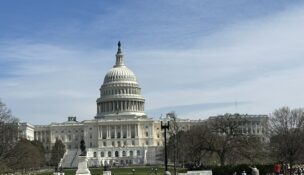Statute cannot bar litigation in federal court
By: dmc-admin//March 17, 2008//
Wisconsin’s statute requiring that litigation over the value of corporate stock be litigated in state courts has been struck down as unconstitutional.
Section 180.1330(2) provides that, if there is a dispute over the fair value of shares, the corporation must either pay the dissenters what they demand or bring a special proceeding “in the circuit court for the county where the principal office … is located.”
However, on Feb. 28, U.S. District Court Judge Charles N. Clevert, Jr., concluded that the provision unconstitutionally strips federal courts of jurisdiction to resolve property disputes.
The case involved a dispute between Albert Trostel & Sons Company (ATS) and two minority shareholders, Edward U. Notz and Sandra Keep Notz, over the value of their shares.
ATS filed a suit in federal court, seeking a determination of their fair value.
All the requirements for diversity jurisdiction in federal court were met, but the Notzes interposed the statute as an affirmative defense to the court’s jurisdiction.
Longstanding precedent of the U.S. Supreme Court holds that a state may not limit to its own state courts an action to enforce personal or property rights created by state law. Railway Co. v. Whitton’s Admin., 80 U.S. [13 Wall] 270, 286 (1872).
The shareholders contended, however, that the venue provision in the statute represents an enforceable contractual agreement. They argued that, because Chapter 180 is generally deemed a part of the corporate charter, therefore, the statute is part of the binding contract between ATS and its shareholders.
The Notzes argued that the corporation thus waived its right to federal court jurisdiction over appraisal proceedings.
In support of their position, the Notzes cited a recent decision from the Eastern District of Virginia, Middleburg Training Center v. Firestone, 477 F.Supp.2d 719 (E.D.Va.2007).
Interpreting a Virginia statute identical in substance to Wisconsin’s, the Virginia court adopted the argument put forth by the Notzes in the case at bar, concluding that the statute was a valid forum selection clause, and the corporation and shareholders were bound by it.
Finding that general corporation law “is just as much a part of the contract between the corporation and its stockholders as are any other documents,” the Virginia court upheld the validity of the forum selection statute.
However, Judge Clevert rejected the reasoning in Middleburg as inconsistent with the Supreme Court’s precedents, reasoning, “Cloaking the matter as a contractual forum selection clause agreed to by the parties through involuntary waiver cannot bypass the fact that it is a state-statute-based forum selection clause.”
Clevert found the clauses indistinguishable from other forum selection clauses the Supreme Court has struck down (interestingly, also involving Wisconsin corporations statutes).
In Home Insurance Co. v. Morse, 87 U.S. [20 Wall] 445 (1874), the Court struck down a Wisconsin statute barring corporations from removing any action filed by a Wisconsin citizen in state court to federal court.
And in Donald v. Philadelphia & Reading Coal & Iron Co., 241 U.S. 329, 333 (1916), the Court struck down a Wisconsin statute that revoked the license of foreign corporations doing business in the state if they remove actions to federal court.
Finding that the statute at issue operates “more as a state bar on the ability of parties to litigate property rights in federal court than a contractual agreement to litigate disputes in a Wisconsin circuit court,” Judge Clevert found Morse and Donald indistinguishable, and held the statute unconstitutional.
After finding that abstention was not warranted either, the court denied the Notzes’ motions to dismiss.
Legal News
- Former Wisconsin police officer charged with 5 bestiality felony counts
- Judge reject’s Trump’s bid for a new trial in $83.3 million E. Jean Carroll defamation case
- The Latest: Supreme Court arguments conclude in Trump immunity case
- Net neutrality restored as FCC votes to regulate internet providers
- Wisconsin Attorney General asks Congress to expand reproductive health services
- Attorney General Kaul releases update at three-year anniversary of clergy and faith leader abuse initiative
- State Bar leaders remain deeply divided over special purpose trust
- Former Wisconsin college chancellor fired over porn career is fighting to keep his faculty post
- Pecker says he pledged to be Trump campaign’s ‘eyes and ears’ during 2016 race
- A conservative quest to limit diversity programs gains momentum in states
- Wisconsin prison inmate pleads not guilty to killing cellmate
- Waukesha man sentenced to 30 years for Sex Trafficking
WLJ People
- Power 30 Personal Injury Attorneys – Russell Nicolet
- Power 30 Personal Injury Attorneys – Benjamin Nicolet
- Power 30 Personal Injury Attorneys – Dustin T. Woehl
- Power 30 Personal Injury Attorneys – Katherine Metzger
- Power 30 Personal Injury Attorneys – Joseph Ryan
- Power 30 Personal Injury Attorneys – James M. Ryan
- Power 30 Personal Injury Attorneys – Dana Wachs
- Power 30 Personal Injury Attorneys – Mark L. Thomsen
- Power 30 Personal Injury Attorneys – Matthew Lein
- Power 30 Personal Injury Attorneys – Jeffrey A. Pitman
- Power 30 Personal Injury Attorneys – William Pemberton
- Power 30 Personal Injury Attorneys – Howard S. Sicula











